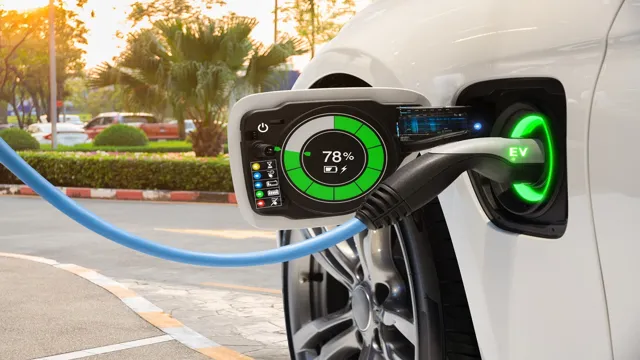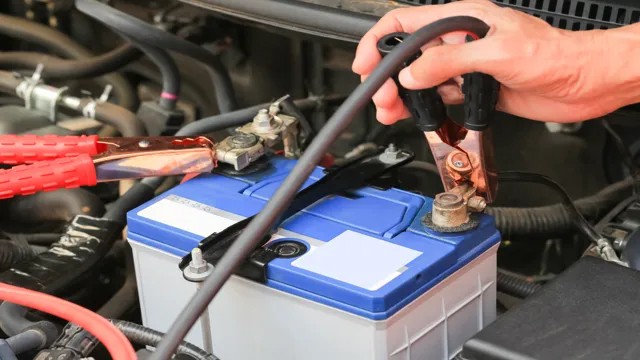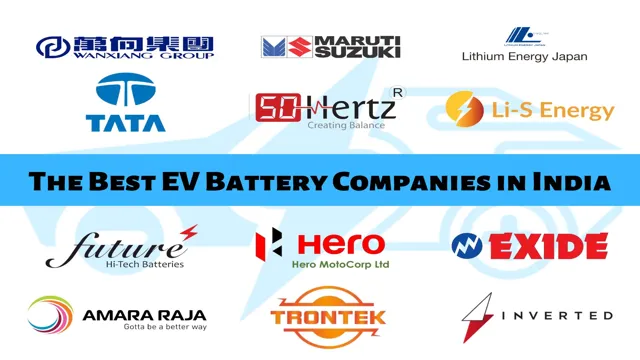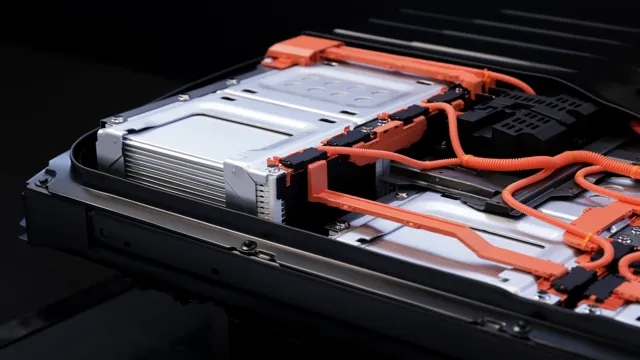Revolutionizing Your Charging Game: Exploring the Power of Using Storage Batteries to Charge Your Electric Car
If you’re an EV owner, you’re probably aware of the challenges that come with finding a charging station. It can be both inconvenient and time-consuming, especially if you’re traveling long distances. But have you ever considered charging your EV with a battery instead? That’s right, it’s now possible to power up your vehicle without relying on charging stations alone.
In this blog post, we’ll take a closer look at the concept of charging an EV with a battery, its advantages, and how it works. So buckle up and let’s get started!
Benefits of Using a Storage Battery
Electric vehicles have gained immense popularity in the past few years, and so has the use of storage batteries. It is common knowledge that these batteries can power up various electronics at home, but can you charge an electric car with storage battery too? The answer is a resounding yes! In fact, using a storage battery to charge your EV has numerous benefits. Firstly, it saves you money as electricity prices fluctuate throughout the day, and you can charge the battery during off-peak hours when prices are lower.
Secondly, it provides greater energy security, as the battery can maintain power during blackouts or in areas with unreliable power supply. Furthermore, it also helps reduce carbon footprint and promotes renewable energy usage. With storage batteries, EV owners can conveniently charge their vehicles at home, ensuring a green and sustainable future.
Reduced Energy Costs
One of the most significant benefits of using a storage battery is that it can significantly reduce energy costs. By storing excess energy produced by renewable sources such as solar panels or wind turbines, homeowners can rely less on grid-supplied electricity, which is often more expensive. The battery system ensures that energy is readily available during peak hours when electricity prices are high, allowing homeowners to save money on their energy bills.
Additionally, the use of storage batteries can help to reduce strain on the electricity grid, which can lead to lower demand charges. The bottom line is that with a storage battery, homeowners can reduce their reliance on grid-supplied electricity and benefit from substantial cost savings in the process. By investing in a storage battery, homeowners are not only saving money but also contributing to a cleaner, more sustainable future.

Charge on the Go
Using a storage battery to charge your devices on the go is a game-changer, and there are several reasons why. For starters, it provides convenience and freedom. You no longer have to worry about finding an electrical outlet or being tethered to one spot while your device charges.
With a storage battery, you can charge your device anytime, anywhere, and on your own terms. Additionally, it offers peace of mind. You won’t have to stress about running out of battery power during crucial moments, such as an important call or navigating to a new location.
Lastly, it’s eco-friendly. Storing energy for future use is a way to reduce the need for energy production, which means fewer greenhouse gas emissions and less pollution. Overall, using a storage battery to charge your devices on the go is a smart and practical solution that benefits both you and the environment.
Maximize Your Solar Investment
Maximizing your solar investment is all about finding ways to save money while enjoying the benefits of renewable energy. One way to do this is by using a storage battery. Not only does it allow you to store excess energy from the sun to use later when the sun isn’t shining, but it also helps you avoid peak electricity rates.
By using your stored energy during times of high demand, you can save on your energy bills while still having the power you need. A storage battery also provides backup power during blackouts, ensuring that you’ll never be without electricity. It’s like having your own personal power plant! Plus, with federal tax credits and other incentives available, the cost of installing a battery can be more affordable than you think.
So don’t miss out on the benefits of a storage battery; talk to your solar provider today and start maximizing your solar investment.
Types of Storage Batteries
Yes, you can charge an electric car with a storage battery. In fact, there are different types of storage batteries that can be used for this purpose. One popular type is the lithium-ion battery, which is commonly used in electric vehicles due to its high energy density and long cycle life.
Other types of storage batteries that can be used include lead-acid batteries, nickel-cadmium batteries, and flow batteries. Depending on the specific battery and the electric car in question, the charging process may vary. However, in general, the charging process involves connecting the battery to the electric car’s charging port using a specialized cable.
It is important to note that charging an electric car using a storage battery may take longer than charging it using a traditional charging station since storage batteries typically have lower charging rates. Nonetheless, using a storage battery to charge an electric car can be a convenient and cost-effective option, especially for those who live in areas with limited access to charging infrastructure.
Lithium-ion
Lithium-ion batteries are a popular type of storage battery used in a variety of applications. These batteries have a high energy density, making them ideal for use in devices such as laptops, smartphones, and electric vehicles. There are several different types of lithium-ion batteries, which vary in their chemistry and performance characteristics.
For example, some batteries may be optimized for high energy capacity, while others may be optimized for high power output. Additionally, some batteries may be designed to be more durable or to have a longer lifespan than others. When selecting a lithium-ion battery, it’s important to consider the specific requirements of the application, as well as any safety considerations.
Overall, lithium-ion batteries offer a range of benefits over other types of storage batteries, including high efficiency, long life, and the ability to be recharged quickly and easily.
Lead Acid
Lead Acid When it comes to storage batteries, there are various types to choose from. Each type has its own advantages and disadvantages, making it crucial to pick the right one for your needs. One of the most popular types is lead-acid batteries.
These batteries have been around for well over a century and are renowned for their reliability. They are often used in vehicles, boats, and other applications where a lot of power is needed. One of the main benefits of lead-acid batteries is that they are affordable and readily available.
Plus, they are easy to maintain. However, one downside is that they are quite heavy and bulky, which can be problematic in some instances. Despite this, lead-acid batteries remain one of the best choices for those looking for a reliable and affordable storage solution.
Saltwater
Saltwater Storage Batteries When it comes to storing energy, there are several types of storage batteries, but one that has been gaining popularity in recent years is the saltwater battery. These types of batteries use saltwater as an electrolyte solution to store energy. They are environmentally-friendly, safe, and non-toxic, making them an attractive option for homeowners and businesses alike.
The saltwater battery has a high cycle life, which means they can last a long time and be recharged over and over again. Additionally, they can withstand extreme temperature conditions, making them a reliable option for harsh climates. Not to mention that they are affordable compared to other storage battery options.
So, if you’re looking for a sustainable and reliable energy storage solution, a saltwater battery may be a great fit for you.
Compatibility with EVs
If you own an electric car, you might be wondering if you can charge it with a storage battery. The answer is yes, but it’s important to make sure that the battery you’re using is compatible with your electric vehicle. Some EVs are built to work with specific types of batteries, so it’s important to check the manufacturer’s recommendations before making any decisions.
Additionally, you’ll want to make sure that the battery you choose has enough capacity to provide a full charge to your car. Keep in mind that using a storage battery to charge your EV can be a convenient way to extend your driving range, but it may not be the most cost-effective solution. You’ll need to weigh the benefits against the costs to decide if a storage battery is right for you.
Overall, as long as you do your research and choose a compatible battery, you can charge your electric car with a storage battery and enjoy all the benefits of emission-free driving.
Considerations for Charging
When it comes to charging electric vehicles (EVs), it’s important to consider compatibility. Not all charging stations are compatible with all types of EVs, so it’s essential to make sure that the station you’re using will work with your vehicle’s charging port. This is why it’s essential to pay attention to the charging cables and connectors that come with your EV, as well as the charging standards that it supports.
There are several different types of connectors and charging standards, including CHAdeMO, CCS, and Tesla Superchargers. Make sure to research the charging stations available in your area to ensure that they’re compatible with your vehicle, and always bring your own charging cable just in case. By paying attention to compatibility, you can make sure that your vehicle is always charged and ready to go whenever you need it.
Types of EV Chargers
When it comes to electric vehicle (EV) chargers, there are a few different types to consider. One important aspect to keep in mind is compatibility with your EV, as not all chargers will work with all vehicles. Level 1 chargers, for example, are the most basic and can be used with any EV that has a standard plug.
Level 2 chargers, on the other hand, require a specific plug type and may not work with all EV models. Meanwhile, fast chargers, also known as DC fast chargers, can provide a quick boost to your EV’s battery, but again, not all vehicles can handle this type of charger. Be sure to do your research and check your EV’s compatibility before investing in a charger.
Conclusion
In conclusion, while it may be possible to charge an electric car with a storage battery, it’s not exactly a straightforward process. You may need to jump through a few hoops and make some modifications to your charging station setup. So, while you might have a few tricks up your sleeve to go electric without a charging station readily available, it’s always best to plan ahead.
After all, there’s nothing better than a fully charged battery and a smooth ride to get you to your destination in style. As they say, where there’s a will, there’s a way – and if there’s a Volt, there’s always a charge waiting to happen!”
FAQs
What is a storage battery?
A storage battery is a type of rechargeable battery that is used to store electrical energy.
What is an electric car?
An electric car is a type of vehicle that is powered by an electric motor and battery rather than a traditional gasoline engine.
How does charging an electric car with a storage battery work?
To charge an electric car with a storage battery, the battery is first charged from an external power source. Then, the charged battery is connected to the electric car’s charging port to transfer the stored energy to the car’s battery.
Can any type of storage battery be used to charge an electric car?
No, not all types of storage batteries are suitable for charging electric cars. Batteries must have a high voltage and capacity to effectively charge an electric car’s battery. Lithium-ion batteries are commonly used for this purpose.
How long does it take to charge an electric car with a storage battery?
The charging time for an electric car with a storage battery will vary based on the capacity of the battery and the car’s charging speed. In general, it can take several hours to fully charge an electric car using a storage battery.





